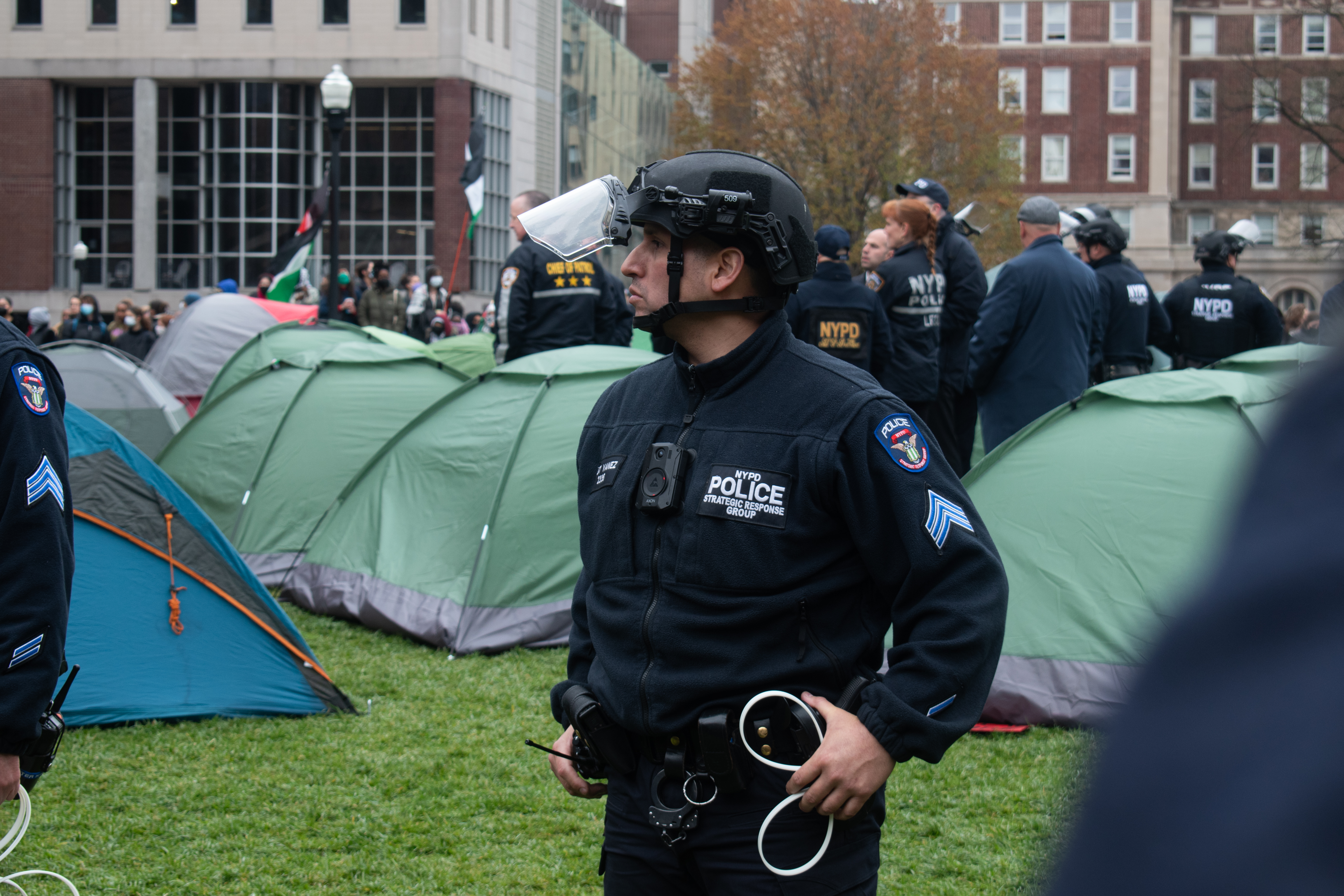
By Sydney Lee / Senior Staff Photographer
By
Oren Root • April 22, 2024 at 12:01 PM
As a close observer of the events of 1968 and a more distant observer of current events at Columbia, I feel equipped to draw some comparisons between the University leadership then and now.
In 1968, Grayson Kirk had been president of the University for 15 years. Whatever qualities of leadership he may have displayed earlier in his tenure, by the late ’60s, Kirk was an out-of-touch, feckless figurehead. Appointed as vice president and provost in 1967, after five years as dean of Columbia College, David Truman had become the de facto, dynamic leader of the University. Truman was universally expected to be appointed president within a year or two.
On April 30 and May 21, 1968, Kirk and Truman called in the New York Police Department to arrest students and other occupiers who were occupying five buildings—Hamilton, Low, Avery, Fayerweather, Mathematics—and one building, Hamilton, on those dates, respectively. Each action by the NYPD turned into full-scale police riots—both of which I witnessed firsthand in my capacity as a Spectator editor—with more than 100 protesters injured in April and scores more in May.
While Kirk and Truman were on the wrong side of history—pushing the gym with its unequal entrances in Morningside Park and maintaining the University’s ties with the war-related Institute for Defense Analyses—and exhibited catastrophically bad judgment in calling in the police, they never overtly allied themselves with Richard Nixon, George Wallace, or other politicians who made up the reactionary right in the 1960s. They made many mistakes and bad decisions leading up to and during the uprising of 1968, but—at least to this observer—they were not making those decisions in obvious attempts to preserve their positions of power and prestige.
This past Wednesday, April 17, current University President Minouche Shafik disgraced Columbia with her abject
groveling before a right-wing-led committee of the House of Representatives. In response to every Republican importuning Shafik to metaphorically “jump,” her response was a metaphorical “how high?” Her appeasement of these MAGA culture warriors renders Neville Chamberlain in Munich a comparative profile in courage.
In Washington, D.C., Shafik seemingly promised those who stand for everything base in our politics to unleash an ideological reign of terror on faculty and students who support the Palestinians who are being massacred in Gaza. This was nothing new, but rather a continuation of months of repression against those whose speech Shafik, the trustees, and major donors disagree with. Based upon the flimsiest of purported justifications, the University
suspended Columbia’s chapters of Jewish Voice for Peace—hardly an antisemitic group—and Students for Justice in Palestine.
Shafik and her administrators
rewrote University policies to try to strangle and isolate peaceful protest. Together, they mobilized the University disciplinary processes to summarily suspend students, including several evictions of Barnard students. At her testimony, she made clear that faculty who supported the Palestinian cause would do so at the risk of their continued employment, not to mention their future advancement.
After abasing herself on Wednesday in Washington—in what appeared to this observer as a cynical attempt to avoid losing her prestigious position—Shafik called in the police on Thursday leading to the arrest of pro-Palestinian students who were camped out on South Lawn. These students were doing nothing to disrupt the University, nor threaten Jewish students. Maybe they were maliciously “threatening” the grass on the lawn. More seriously, what conceivable harm were those camped out on South Lawn causing? Was Shafik worried that letting them remain would make her look “weak,” or undercut her support from the trustees and major donors?
As quoted in Spectator, NYPD Chief of Patrol John Chell
implicitly rebuked Shafik at a Thursday press conference, stating: “To put this in perspective, the students that were arrested were peaceful, offered no resistance whatsoever, and were saying what they wanted to say in a peaceful manner.” When the well-known-to-be-tough NYPD Chief of Patrol questions the legitimacy of a university requesting police action, one knows that the University has gone off the rails.
As a direct result of their gross misjudgments in calling in the police in 1968, Kirk resigned that August and Truman the following January. But, as noted above, neither had been involved in supporting McCarthyite positions or penalizing students and faculty for speech or peaceful protest.
Let’s hope that by August of this year, Shafik has followed her 1968 predecessors’ examples and resigned. She has disgraced the good name of Columbia, caused incalculable nationwide injury to increasingly fragile academic freedoms, and wreaked unjustifiable harm on students and faculty members who are protesting the wanton killing of defenseless men, women, and children—many thousands of children—in Gaza. It’s time to go, Minouche.
Oren Root, CC ’69, was executive editor of Spectator from 1968 to 1969 and a co-author of Up Against the Ivy Wall: A History of the Columbia Crisis.

